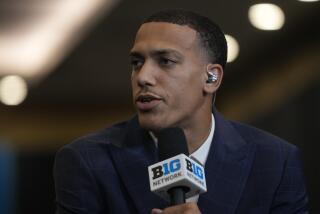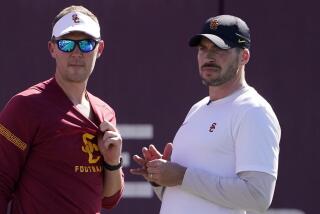The Role Model : USCâs Keyshawn Johnson Tries to Succeed Morton--and in Life
A lot of people are counting on Keyshawn Johnson this season.
There are the USC football coaches, who believe Johnson could be an outstanding replacement for All-American receiver Johnnie Morton.
There are his teammates, who know that the teamâs success could be tied to Johnsonâs.
And, there are those who helped Johnson pull himself out of a morass of drug dealing and gang banging. Those are the people he wants to please.
Johnson is trying to be a role model. He has talked to elementary school students about his past and its pitfalls. He has written to high school students about not giving up on themselves.
âI started hanging out with the wrong crowd and got myself in trouble,â Johnson wrote in Cal-Hi Sports this year. âI was selling drugs, gang banging and robbing people on the streets when I was finally arrested in the eighth grade and put in a correctional facility for nine months. I didnât do these things because I needed money, but because I needed a change of pace.â
Johnson had seemed to be heading in the right direction before he decided to change his pace.
He lived with his mother and brother about a half-mile from USC and, when he was 6, found himself on the practice field with Charles White and Dennis Thurman and other stars of late-1970s Trojan football.
He became a regular at practice, asking for wrist bands, retrieving footballs, carrying helmets and shoulder pads.
âThe players loved it when I asked if I could carry their pads and helmets,â he said. âIt was after practice and they were tired.â
He was a ballboy for the Trojans for seven years during the coaching regimes of John Robinson (on his first tour of duty) and Ted Tollner.
But when Larry Smith moved in as Trojan coach, Johnson moved to the streets. It wasnât long before he found his way to a juvenile detention facility.
âAfter I was released from jail, my brothers and sisters sat me down and told me that it was time for me to take responsibility for myself,â Johnson wrote. â. . . It was at Dorsey (High School) that I finally found myself. Here I was, one of the best athletes in the state and I wasnât preparing myself for college.â
In 1991, Johnson was offered a scholarship to Miami but didnât score well enough on his SAT. He ended up at West Los Angeles Community College, where he struggled with his grades and quit the football team after seven games.
âHe was having a bad year, but we were all having a bad year,â said Rob Hager, Johnsonâs coach at West L.A.
âHe sat out a year, took a hard look at reality (and) he took on some responsibility. He took inventory of himself, as to what he wanted to do.
âI never saw him in 1992. When he came back to our program in â93, he had a different attitude. Heâs a mature guy for his years, heâs been around.â
The two years that Johnson had dropped out of sports, he said he was learning to become a student.
Johnson bounced back last season with a flourish, scoring 12 touchdowns in nine West L.A. games and catching 55 passes for 1,245 yards, an average of 22.6 yards a catch.
Johnson has started this season slowly. A thigh bruise has limited his practice time, and in Saturdayâs 24-17 victory over Washington, he caught one pass for five yards.
The bad luck that has followed Johnson on the field, he believes, might also be dogging him off it.
According to court records, a warrant for the arrest of a Keyshawn Johnson was issued in 1991 for two counts of misdemeanor theft. The warrant says Johnson is accused of stealing a portable telephone valued at $900, and a pager from a Van Nuys electronics store.
It lists Johnsonâs address as the one he was living at in 1991, and the physical description also matches. It also lists the make and model of a car that Johnson had at that time. However, the birthdate on the warrant is exactly one month and one year off from Johnsonâs birthdate.
The Keyshawn Johnson wanted for theft is also wanted for failure to appear on five moving violations and driving on a suspended license. USCâs Johnson says there is a possibility that his driverâs license is suspended, but says he no longer drives. He also said his driverâs license was stolen in 1990.
Johnson says he did not know about the warrant until told about it by a Times reporter last week. He strongly denies any charges and says it is a case of mistaken identity. Johnson is even seeking help to clear his name.
Police generally do little more than write a report on any misdemeanor crimes. The rise in crime in the Southland leaves police virtually no time to investigate misdemeanors or to execute those warrants. The warrants are usually only served when discovered in traffic stops.
A USC official said the school also plans to investigate the warrant in the hopes of clearing its receiverâs name.
*
USC has high expectations for Johnson. âHe can do all the things Morton could do, and heâs bigger and faster,â receivers coach Mike Sanford said.
And Hager has no problem comparing Johnson to Morton, who was a first-round draft choice of the Detroit Lions.
âKeyshawn is a phenomenal talent,â he said. âHeâs tall, strong and fast and heâs got a great eye for the ball. And he likes to compete. Itâs very reasonable to think he can succeed Morton. Heâs got that kind of talent, and Keyshawn wonât settle for anything less than that.â
Robinson, Johnsonâs current coach, echoes that sentiment: âKeyshawn is going to be fun to watch. I think heâs going to be a dynamic player.â
Johnson wants to be dynamic in other areas, as well. Last June, he talked about his background in South Central L.A. at Bixby Elementary School in Long Beach.
âHe was sensational,â principal Sue Fellenzer said. âHe talked about 15 minutes and he spoke from his heart, with that big Magic Johnson smile. The kids not only loved him, but so did the parents.â
Johnson said he talked to the children about âmistakes I made, that they shouldnât do what I did.â
He summed up his life this way: âI donât blame anyone for the mistakes I made when I was younger. I just want people to know that there is always hope for those that have gone astray.â
This is a subject he can discuss from experience.
More to Read
Go beyond the scoreboard
Get the latest on L.A.'s teams in the daily Sports Report newsletter.
You may occasionally receive promotional content from the Los Angeles Times.






